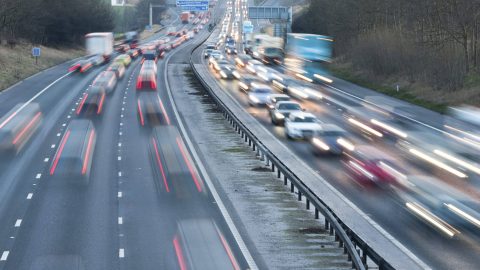Do you feel guilty about driving a car? – What’s this question all about? Whereas the term flygskam (flight shame) has become popular outside of Sweden in recent years, there are far fewer people who feel they need to justify driving a car.
It has become routine for booking websites to offer compensation options for the emissions produced by flights such as the financing of climate projects. However, we are yet to hear about petrol stations where you can buy climate certificates after filling up.
The difference in perception can be explained by the fact that the aircraft is the most climate-damaging means of transportation around. But a look at the breakdown of global greenhouse emissions shows that flight passengers might have less reason to feel ashamed than expected, relatively speaking, since flying accounts for 3% of total greenhouse emissions. Road traffic makes up almost 20% of global greenhouse emissions.
The day yellow safety vests came out of the glove compartment
It comes as no surprise that those governments that are serious about (averting) climate change try to take action in the area of road traffic. However, ramping up fuel prices in order to achieve a certain effect in public behaviour does not exactly bring votes. In France, this was in fact the moment the “Gilets jaunes” movement was born – annoyed protesters wearing yellow safety vests as identifying feature during their demonstrations. However, the safety aspect of these vests was quickly thrown overboard as the protests turned into riots interspersed with arson.
International motor show without cars?
The reaction in Germany to the recently announced climate policy of the federal government was a non-event as far as protests were concerned – despite the fact that it not only meant a gradual increase in taxes on petrol in the coming years, but also came with the introduction of a new motor vehicle tax based on fuel consumption. A few days before, we had seen photos of protesters taken at the largest global motor show in Frankfurt; their demands were a car-free future and a massive expansion of the bus and train network.
Tell me where your car is parked!
A recent study by the Federal Office for Motor Vehicles indicates – unsurprisingly – that the regional distribution of passenger car permits depends crucially on population density. In many rural areas (and I know this from first-hand experience) you feel like they have taken away your freedom if you don’t own a car. According to the study, school bus trips account for 80 to 85% of local traffic. By contrast, the percentage of car ownership in Berlin is the lowest in Germany (“only” every third person owns a car). This means the path to a car-free future will be an arduous one; the replacement of the combustion engine seems less unrealistic by comparison.
Where to take the German engineering ingenuity?
An electric car contains only 15% of the number of parts that a car with combustion engine requires. It is accordingly “easy” to manufacture an electric car, as the example of Deutsche Post shows. Since none of the big manufacturers wanted to fulfil the particular specifications of Deutsche Post, the group just built its own electric delivery vehicle and now even considers floating the production unit on the stock exchange as spin-off due to its success.
The development of fuel cells as alternative form of propulsion requires significantly more engineering know-how and therefore harbours better perspectives as far as future jobs in the automotive sector are concerned. Here, the biggest producers diverge with regard to the question of what should be the propulsion technology of the future. As they say: it is difficult to make predictions, especially about the future.
Be that as it may, we wish you an exciting, climate-neutral reading experience of our ESG Letter (without accidents).
Legal disclaimer
This document is an advertisement. Unless indicated otherwise, source: Erste Asset Management GmbH. The language of communication of the sales offices is German and the languages of communication of the Management Company also include English.
The prospectus for UCITS funds (including any amendments) is prepared and published in accordance with the provisions of the InvFG 2011 as amended. Information for Investors pursuant to § 21 AIFMG is prepared for the alternative investment funds (AIF) administered by Erste Asset Management GmbH pursuant to the provisions of the AIFMG in conjunction with the InvFG 2011.
The currently valid versions of the prospectus, the Information for Investors pursuant to § 21 AIFMG, and the key information document can be found on the website www.erste-am.com under “Mandatory publications” and can be obtained free of charge by interested investors at the offices of the Management Company and at the offices of the depositary bank. The exact date of the most recent publication of the prospectus, the languages in which the fund prospectus or the Information for Investors pursuant to Art 21 AIFMG and the key information document are available, and any other locations where the documents can be obtained are indicated on the website www.erste-am.com. A summary of the investor rights is available in German and English on the website www.erste-am.com/investor-rights and can also be obtained from the Management Company.
The Management Company can decide to suspend the provisions it has taken for the sale of unit certificates in other countries in accordance with the regulatory requirements.
Note: You are about to purchase a product that may be difficult to understand. We recommend that you read the indicated fund documents before making an investment decision. In addition to the locations listed above, you can obtain these documents free of charge at the offices of the referring Sparkassen bank and the offices of Erste Bank der oesterreichischen Sparkassen AG. You can also access these documents electronically at www.erste-am.com.
Our analyses and conclusions are general in nature and do not take into account the individual characteristics of our investors in terms of earnings, taxation, experience and knowledge, investment objective, financial position, capacity for loss, and risk tolerance. Past performance is not a reliable indicator of the future performance of a fund.
Please note: Investments in securities entail risks in addition to the opportunities presented here. The value of units and their earnings can rise and fall. Changes in exchange rates can also have a positive or negative effect on the value of an investment. For this reason, you may receive less than your originally invested amount when you redeem your units. Persons who are interested in purchasing units in investment funds are advised to read the current fund prospectus(es) and the Information for Investors pursuant to § 21 AIFMG, especially the risk notices they contain, before making an investment decision. If the fund currency is different than the investor’s home currency, changes in the relevant exchange rate can positively or negatively influence the value of the investment and the amount of the costs associated with the fund in the home currency.
We are not permitted to directly or indirectly offer, sell, transfer, or deliver this financial product to natural or legal persons whose place of residence or domicile is located in a country where this is legally prohibited. In this case, we may not provide any product information, either.
Please consult the corresponding information in the fund prospectus and the Information for Investors pursuant to § 21 AIFMG for restrictions on the sale of the fund to American or Russian citizens.
It is expressly noted that this communication does not provide any investment recommendations, but only expresses our current market assessment. Thus, this communication is not a substitute for investment advice.
This document does not represent a sales activity of the Management Company and therefore may not be construed as an offer for the purchase or sale of financial or investment instruments.
Erste Asset Management GmbH is affiliated with the Erste Bank and austrian Sparkassen banks.
Please also read the “Information about us and our securities services” published by your bank.

